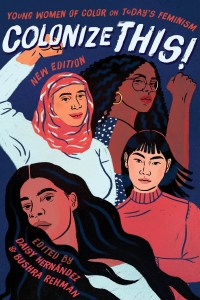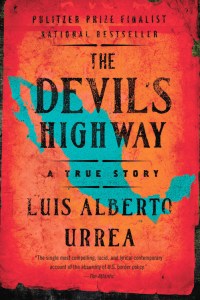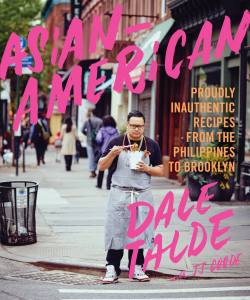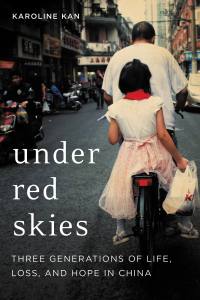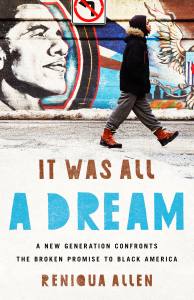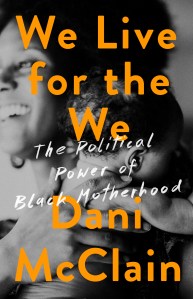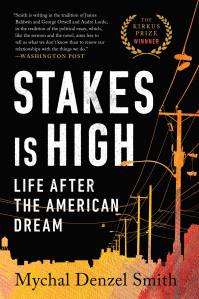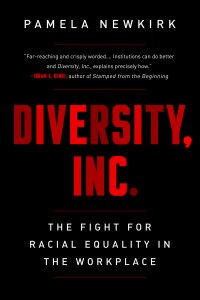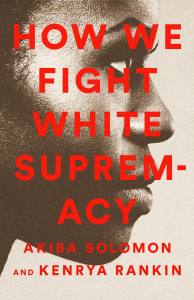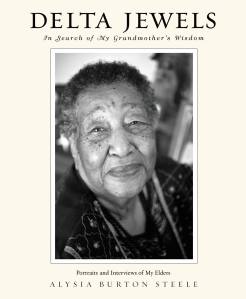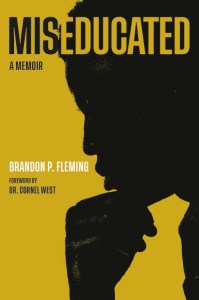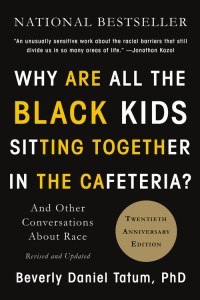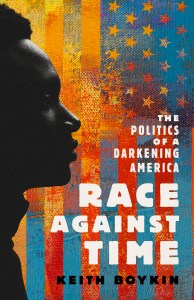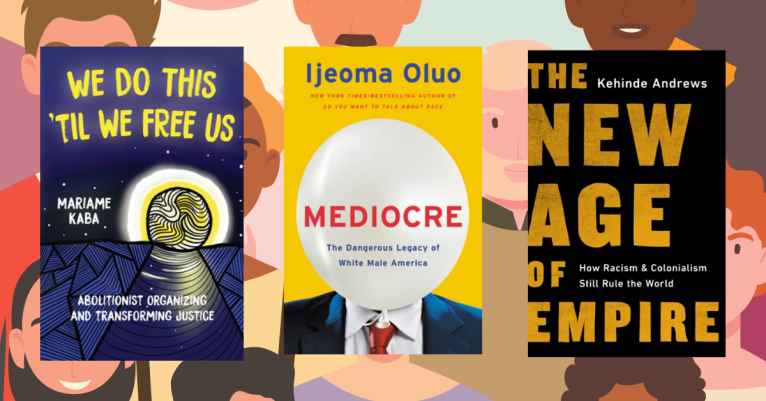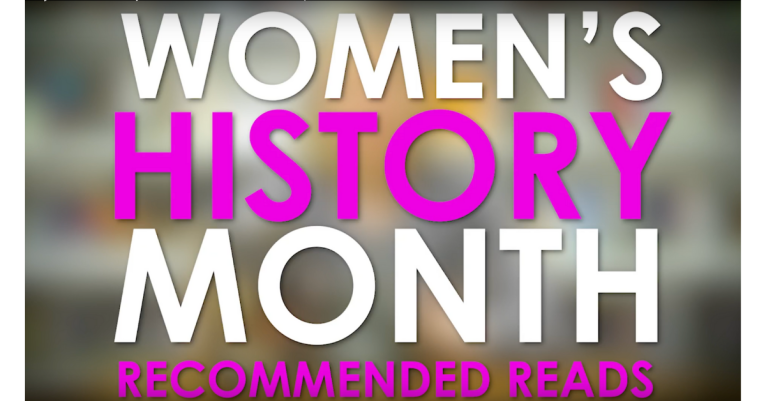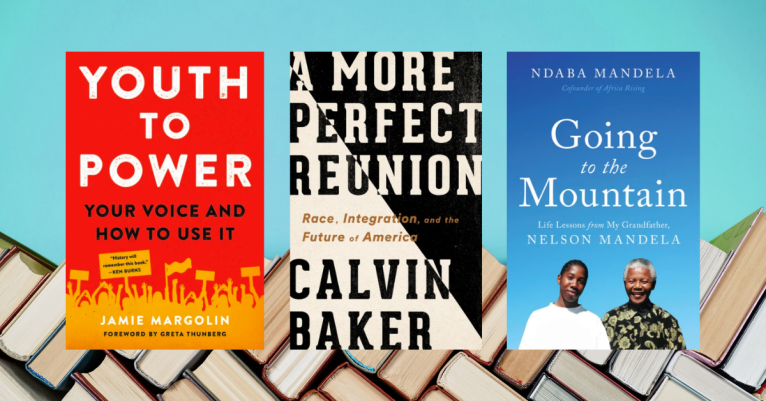A Global Reading List on Race
These 16 books explore race around the world from award-winning authors, editors, chefs, journalists, and more. From Black motherhood to the Asian American culinary experience, these books encapsulate a global approach to learning about race.
In May 2001, a group of men attempted to cross the Mexican border into the desert of southern Arizona, through the deadliest region of the continent, the "Devil's Highway." Three years later, Luis Alberto Urrea wrote about what happened to them. The result was a national bestseller, a Pulitzer Prize finalist, a "book of the year" in multiple newspapers, and a work proclaimed as a modern American classic.
In many ways, Chinese Americans today are exemplars of the American Dream: during a crowded century and a half, this community has gone from indentured servitude, second-class status and outright exclusion to economic and social integration and achievement. But this narrative obscures too much: the Chinese Americans still left behind, the erosion of the American Dream in general, the emergence -- perhaps -- of a Chinese Dream, and how other Americans will look at their countrymen of Chinese descent if China and America ever become adversaries. As Chinese Americans reconcile competing beliefs about what constitutes success, virtue, power, and purpose, they hold a mirror up to their country in a time of deep flux.
In searching, often personal essays that range from the meaning of Confucius to the role of Chinese Americans in shaping how we read the Constitution to why he hates the hyphen in "Chinese-American," Eric Liu pieces together a sense of the Chinese American identity in these auspicious years for both countries. He considers his own public career in American media and government; his daughter's efforts to hold and release aspects of her Chinese inheritance; and the still-recent history that made anyone Chinese in America seem foreign and disloyal until proven otherwise. Provocative, often playful but always thoughtful, Liu breaks down his vast subject into bite-sized chunks, along the way providing insights into universal matters: identity, nationalism, family, and more.
Born in Chicago to Filipino parents, Dale Talde grew up both steeped in his family's culinary heritage and infatuated with American fast food--burgers, chicken nuggets, and Hot Pockets. Today, his dual identity is etched on the menu at Talde, his always-packed Brooklyn restaurant. There he reimagines iconic Asian dishes, imbuing them with Americana while doubling down on the culinary fireworks that made them so popular in the first place. His riff on pad thai features bacon and oysters. He gives juicy pork dumplings the salty, springy exterior of soft pretzels. His food isn't Asian fusion; it's Asian-American.
Now, in his first cookbook, Dale shares the recipes that have made him famous, all told in his inimitable voice. Some chefs cook food meant to transport you to Northern Thailand or Sichuan province, to Vietnam or Tokyo. Dale's food is meant to remind you that you're home.
Through the stories of three generations of women in her family, Karoline Kan, a former New York Times reporter based in Beijing, reveals how they navigated their way in a country beset by poverty and often-violent political unrest. As the Kans move from quiet villages to crowded towns and through the urban streets of Beijing in search of a better way of life, they are forced to confront the past and break the chains of tradition, especially those forced on women.
Raw and revealing, Karoline Kan offers gripping tales of her grandmother, who struggled to make a way for her family during the Great Famine; of her mother, who defied the One-Child Policy by giving birth to Karoline; of her cousin, a shoe factory worker scraping by on 6 yuan (88 cents) per hour; and of herself, as an ambitious millennial striving to find a job--and true love--during a time rife with bewildering social change.
Under Red Skies is an engaging eyewitness account and Karoline's quest to understand the rapidly evolving, shifting sands of China. It is the first English-language memoir from a Chinese millennial to be published in America, and a fascinating portrait of an otherwise-hidden world, written from the perspective of those who live there.
"A fascinating story, full of subtle twists and turns." —Washington Post
To most Americans, Malcolm X and Martin Luther King Jr. represent contrasting ideals: self-defense versus nonviolence, Black Power versus civil rights, the sword versus the shield. The struggle for Black freedom is wrought with the same contrasts. While nonviolent direct action is remembered as an unassailable part of American democracy, the movement’s militancy is either vilified or erased outright.
In The Sword and the Shield, Peniel E. Joseph upends these misconceptions and reveals a nuanced portrait of two men who, despite markedly different backgrounds, inspired and pushed each other throughout their adult lives. This is a strikingly revisionist account of Malcolm and Martin, the era they defined, and their lasting impact on today’s Movement for Black Lives.
Young Black Americans have been trying to realize the promise of the American Dream for centuries and coping with the reality of its limitations for just as long. Now, a new generation is pursuing success, happiness, and freedom -- on their own terms.
In It Was All a Dream, Reniqua Allen tells the stories of Black millennials searching for a better future in spite of racist policies that have closed off traditional versions of success. Many watched their parents and grandparents play by the rules, only to sink deeper and deeper into debt. They witnessed their elders fight to escape cycles of oppression for more promising prospects, largely to no avail. Today, in this post-Obama era, they face a critical turning point.
Interweaving her own experience with those of young Black Americans in cities and towns from New York to Los Angeles and Bluefield, West Virginia to Chicago, Allen shares surprising stories of hope and ingenuity. Instead of accepting downward mobility, Black millennials are flipping the script and rejecting White America's standards. Whether it means moving away from cities and heading South, hustling in the entertainment industry, challenging ideas about gender and sexuality, or building activist networks, they are determined to forge their own path.
Compassionate and deeply reported, It Was All a Dream is a celebration of a generation's doggedness against all odds, as they fight for a country in which their dreams can become a reality.
In We Live for the We, first-time mother Dani McClain sets out to understand how to raise her daughter in what she, as a black woman, knows to be an unjust -- even hostile -- society. Black women are more likely to die during pregnancy or birth than any other race; black mothers must stand before television cameras telling the world that their slain children were human beings. What, then, is the best way to keep fear at bay and raise a child so she lives with dignity and joy?
McClain spoke with mothers on the frontlines of movements for social, political, and cultural change who are grappling with the same questions. Following a child's development from infancy to the teenage years, We Live for the We touches on everything from the importance of creativity to building a mutually supportive community to navigating one's relationship with power and authority. It is an essential handbook to help us imagine the society we build for the next generation.
The events of the past decade have forced us to reckon with who we are and who we want to be. We have been invested in a set of beliefs about our American identity: our exceptionalism, the inevitable rightness of our path, the promise that hard work and determination will carry us to freedom. But in Stakes Is High, Mychal Denzel Smith confronts the shortcomings of these stories -- and with the American Dream itself -- and calls on us to live up to the principles we profess but fail to realize.
Diversity has become the new buzzword, championed by elite institutions from academia to Hollywood to corporate America. In an effort to ensure their organizations represent the racial and ethnic makeup of the country, industry and foundation leaders have pledged hundreds of millions of dollars to commission studies, launch training sessions, and hire consultants and diversity czars. But is it working?
In Diversity, Inc., award-winning journalist Pamela Newkirk shines a bright light on the diversity industry, asking the tough questions about what has been effective—and why progress has been so slow. Newkirk highlights the rare success stories, sharing valuable lessons about how other industries can match those gains. But as she argues, despite decades of handwringing, costly initiatives, and uncomfortable conversations, organizations have, apart from a few exceptions, fallen far short of their goals.
Diversity, Inc. incisively shows the vast gap between the rhetoric of inclusivity and real achievements. If we are to deliver on the promise of true equality, we need to abandon ineffective, costly measures and commit ourselves to combatting enduring racial attitudes.
This celebration of Black resistance, from protests to art to sermons to joy, offers a blueprint for the fight for freedom and justice -- and ideas for how each of us can contribute
Many of us are facing unprecedented attacks on our democracy, our privacy, and our hard-won civil rights. If you're Black in the US, this is not new. As Colorlines editors Akiba Solomon and Kenrya Rankin show, Black Americans subvert and resist life-threatening forces as a matter of course. In these pages, leading organizers, artists, journalists, comedians, and filmmakers offer wisdom on how they fight White supremacy. It's a must-read for anyone new to resistance work, and for the next generation of leaders building a better future.
These ordinary women lived extraordinary lives under the harshest conditions of the Jim Crow era and during the courageous changes of the Civil Rights Movement. With the help of local pastors, Steele recorded these living witnesses to history and folk ways, and shares the significance of being a Black woman -- child, daughter, sister, wife, mother, and grandmother in Mississippi -- a Jewel of the Delta. From the stand Mrs. Tennie Self took for her marriage to be acknowledged in the phone book, to the life-threatening sacrifice required to vote for the first time, these 50 inspiring portraits are the faces of love and triumph that will teach readers faith and courage in difficult times.
Brandon P. Fleming grew up in an abusive home and was shuffled through school, his passing grades a nod to his skill on the basketball court, not his presence in the classroom. He turned to the streets and drug deals by fourteen, saved only by the dream of basketball stardom.
When he suffered a career-ending injury during his first semester at a Division I school, he dropped out of college, toiling on an assembly line, until depression drove him to the edge. Miraculously, his life was spared.
Returning to college, Fleming was determined to reinvent himself as a scholar—to replace illiteracy with mastery over language, to go from being ignored and unseen to commanding attention. He immersed himself in the work of Black thinkers from the Harlem Renaissance to present day. Crucially, he found debate, which became the means by which he transformed his life and the tool he would use to transform the lives of others—teaching underserved kids to be intrusive in places that are not inclusive, eventually at Harvard University, where he would make champions and history.
Through his personal narrative, readers witness Fleming’s transformation, self-education, and how he takes what he learns about words and power to help others like himself. Miseducated is an honest memoir about resilience, visibility, role models, and overcoming all expectations.
Walk into any racially mixed high school and you will see Black, White, and Latino youth clustered in their own groups. Is this self-segregation a problem to address or a coping strategy? How can we get past our reluctance to discuss racial issues?
Beverly Daniel Tatum, a renowned authority on the psychology of racism, argues that straight talk about our racial identities is essential if we are serious about communicating across racial and ethnic divides and pursuing antiracism. These topics have only become more urgent as the national conversation about race is increasingly acrimonious. This fully revised edition is essential reading for anyone seeking to understand dynamics of race and racial inequality in America.
Thomas Sowell is one of the great social theorists of our age. In a career spanning more than a half century, he has written over thirty books, covering topics from economic history and social inequality to political theory, race, and culture. His bold and unsentimental assaults on liberal orthodoxy have endeared him to many readers but have also enraged fellow intellectuals, the civil-rights establishment, and much of the mainstream media. The result has been a lack of acknowledgment of his scholarship among critics who prioritize political correctness.
In the first-ever biography of Sowell, Jason L. Riley gives this iconic thinker his due and responds to the detractors. Maverick showcases Sowell’s most significant writings and traces the life events that shaped his ideas and resulted in a Black orphan from the Jim Crow South becoming one of our foremost public intellectuals.
A Cold Civil War has engulfed the nation.
After a deadly pandemic, shocking incidents of police brutality, a racial justice crisis, and the fall of a dangerous demagogue, America remains more divided than at any time in decades. At the heart of this national crisis is the fear of a darkening America—a country in which there is no longer a predominant white majority.
As the Republican Party has lost the popular vote in seven of the last eight presidential elections, its leaders have incited white Americans in a last-ditch race against time to stop the advance of a new, multiracial emerging majority. Keith Boykin, long time political commentator, has watched this white resentment consume the GOP over the course of a life in politics, activism, and journalism. He has also observed the divisions among Democrats, as white progressives have postponed demands for full racial equity, while Black voters have often been too forgiving of party leaders who have failed to deliver. America can no longer avoid its long overdue reckoning with the past, Boykin argues. With the familiarity of personal experience and the acuity of historical insight, Boykin urges us to fight racism, sexism, xenophobia, and homophobia, and save the union, not just by making Black lives matter, but by making Black lives equal.
By clicking ‘Sign Up,’ I acknowledge that I have read and agree to Hachette Book Group’s Privacy Policy and Terms of Use
